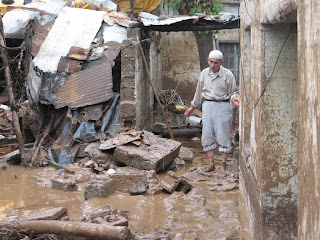Serve God Save the Planet by Dr. Matthew Sleeth. This was a good introductory book for people who may not already know some of the issues surrounding Creation Care. It is also a good practical guide for people who want to get started in conservation practices at home but don't know where to begin. Sleeth covers both the biblical need for Creation Care and why we should care, he gives examples and also shows how he has changed his own life to live more sustainably.
Courage and Calling: Embracing Your God-Given Potential by Gordon T. Smith. This book is affirming and empowering. Smith talks about what it means to align your calling with your vocation, but not forget that calling is also about your life outside of work. A nice relief from books that strictly focus on the working life, Smith covers a wide range life aspects and how that related to your potential and calling, or vocation.
 |
| Mmm, coffee and a good book is how I like to spend my Saturday mornings. |
Books on my list to read:
Green Like God: Unlocking the Divine Plan for our Planet by Jonathan Merritt. I bought this book off Amazon recently, where it retails new for less than $15. The description says: Imagine God recycling bottles and planting trees. In this book by faith and culture writer Merritt, God is honored as the ultimate environmentalist who restores and loves His own creation. Evangelical Christians are less supportive of environmental causes than other groups, a statistic that Merritt attributes to misinformation and politics that hamper understanding. Through a compilation of scripture, statistics, and his own anecdotes, Merritt explains that creation care is a shared moral obligation—not a political viewpoint or a film by Al Gore. The world is God's apologetic about Himself; it is the Christian's job to maintain its beauty and complexity. Merritt arms the reader with Bible verses commanding care for creation; resources and suggestions for green living are given in the appendixes. Himself a convert to the idea of God as green, Merritt is sure to appeal to the hearts of even the most polarized Christians. His guide could be turned into relevant sermon material and should be mandatory reading for churchgoers.
The Gospel According to the Earth: Why the Good Book is a Green Book by Dr. Matthew Sleeth. I bought this one recently as well. It has very high reviews. The description says: From Genesis to Revelation, the Bible is filled with instructions on how we can demonstrate our love for the Creator by caring for the earth. Sleeth leads us on a highly creative journey through Scripture, visiting some of the most important characters in the Bible and discovering what they can teach us about issues such as stewardship, caring for our neighbors, climate change, and pollution. Adam and Eve in the Garden of Eden teach us the importance of physical work in relation to discovering fulfillment and a sense of human purpose, the prophet Daniel calls us to question our dietary habits, and the story of Noah addresses key issues for life on earth: how do we relate to the Creator, to others in the human community, and to the rest of the natural world? With passion and faith, Sleeth provides a new green lens through which we can read the Bible to discover answers to our biggest questions about the environment and how to care for it.
Sustainability on Campus: Stories and Strategies for Change, edited by Peggy Barlett and Geoffrey Chase. I picked this one up at the recent AASHE conference in Denver. The description says: These personal narratives of greening college campuses offer inspiration, motivation, and practical advice. Written by faculty, staff, administrators, and a student, from varying perspectives and reflecting divergent experiences, these stories also map the growing strength of a national movement toward environmental responsibility on campus. Environmental awareness on college and university campuses began with the celebratory consciousness-raising of Earth Day, 1970. Since then environmental action on campus has been both global (in research and policy formation) and local (in efforts to make specific environmental improvements on campuses). The stories in this book show that achieving environmental sustainability is not a matter of applying the formulas of risk management or engineering technology but part of what the editors call "the messy reality of participatory engagement in cultural transformation." The authors of Sustainability on Campus report from a diverse group of institutions ranging from two-year community colleges to famous research universities. They tell of environmental stewardship on campus, curriculum changes, green building design, working with local communities, and system-wide initiatives. Their chronicles include the early mistakes and successes of the Green Task Force at Illinois Wesleyan, the history of an innovative interdisciplinary graduate curriculum at the University of California at Berkeley, the planning and construction of a green Environmental Studies building at Oberlin College, the joint efforts of local businesses and students at Allegheny College to promote eco-tourism in northwest Pennsylvania, a donor-initiated multi-university consortium in South Carolina, and the implementation of sustainability requirements for all students at Oakland Community College in Detroit.
What books are on your list? Do you have a book to recommend to me?









